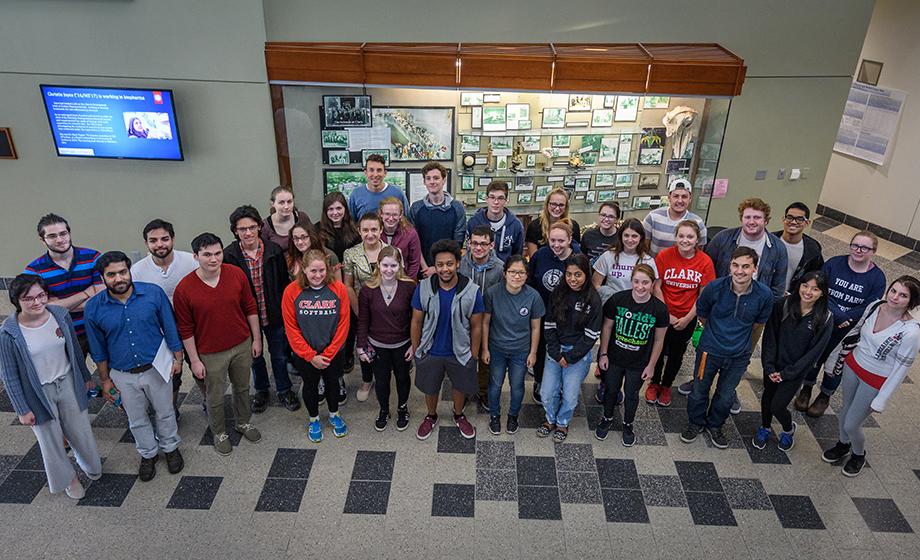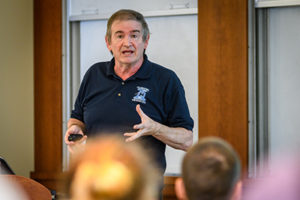A summer of science at Clark

Nearly 50 undergraduate students have received funding to work in faculty’s scientific laboratories this summer.
As part of their 10-week experience, students are attending weekly workshops by faculty researchers, who are sharing advice on everything from writing scientific manuscripts and submitting them to journals, to exploring research-oriented careers in and outside of academia.

The bulk of the students in Clark’s Interdisciplinary Summer Research Program received stipends from the program itself; the rest received funding from University and departmental endowments, faculty research grants, and the LEEP Center. In many cases, the students received funds to live on campus.
“The program’s goal is to develop a greater sense of community and synergy to increase students’ productivity and professional development as researchers,” says Deborah Robertson, professor and Warren Litsky ’45 Endowed Chair of Biology. She co-directs the Interdisciplinary Summer Research Program with Denis Larochelle, associate professor of biology.
Twenty-one students received stipends from the Interdisciplinary Summer Research Program, which forms the basis for the workshops that draw other science students working in labs on campus:
- Christina Bardjis ’19, Foster Lab, Biology.
- Luke Barrows ’19 and Anh-Vy Le ’20, Jakobsche Group, Biochemistry and Molecular Biology (BCMB).
- Sam Brody ’19 and Linnea Menin ’19, Ahlgren Lab, BCMB.
- Eugenia Cojocaru ’20, Thackeray Lab, Biology.
- Zaza Gelashvili ’19, Larochelle Lab, BCMB.
- Dylan Gillespie ’19 and Molly McAuliffe ’19, Nag Lab, BCMB.
- Samuel Hoang ’20, Kudrolli Lab, Physics.
- Chloe Kellum ’19, Kayla Rich ’19, and Rylee Simons ’19, Spratt Lab, BCMB.
- Nikita Kupko ’19, Turnbull Lab, Chemistry.
- Leilana Le ’19, Bergmann Lab, Biology.
- Kayleigh McHugh ’19, Baker Lab, Biology.
- Andrew Mezzi ’19, Maschler Lab, Math and Computer Science.
- Michael O’Connor ’20, Boyer Lab, Physics.
- Ashley Renfro ’19, Meyer Lab, Biology.
- Biruck Tessema ’19, Drewell Lab, BCMB.
- Ella Tuson ’19, Magee Lab, Math and Computer Science.
Workshop topics and presenters include:
- “The Manuscript Process: Function and Foibles,” with Mark Turnbull, professor of chemistry.
- “Connecting Your Summer Research to Professional Pathways,” with Donald Spratt, assistant professor of chemistry and biochemistry and Carl J. and Anna Carlson Endowed Chair, and Michelle Bata, associate dean and director of the LEEP Center.
- “How to Present Data Using Figures and Tables,” with Philip Bergmann, associate professor of biology.
- “Why Collaboration Across Disciplines Can be Critical to a Successful Future in Research,” by Robert Drewell, professor and chair of biology, and Jacqueline Dresch, assistant professor of mathematics.
- “Grant Writing: Asking for and Getting Money for Your Research,” by Nathan Ahlgren, assistant professor of biology.
- “Image Processing Using MATLAB,” by Arshad Kudrolli, professor and chair of physics.
- “Making and Delivering an Effective and Enjoyable Presentation,” by Néva Meyer, assistant professor of biology.
At the end of the workshop series in August, students will present their research in a two-hour session.


